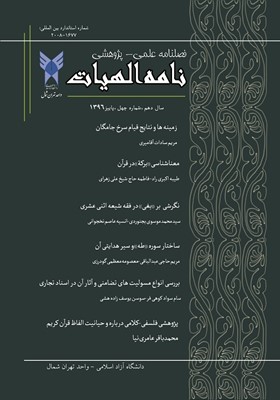Existential realms and the relationship with the "self" in the Qur'an
Subject Areas : Nameh ElahiyatBakhshAli Qanbari 1 * , Mojgan Muhammadi 2
1 - Associate Professor and Member of the Department of Religions and Mysticism, Islamic Azad University of Central Tehran
2 - Assistant Professor and Faculty Member, Department of Theology, Institute of Humanities and Social Studies, University Jihad
Keywords: knowledge, human, relation, Self, Quran, act, Psychic,
Abstract :
The meaning of this writing is "self", the general meaning of the soul, not a specific soul such as amara or lavameh. In this sense, it can be said that it includes all of them. For this reason, the results of this relationship can be high or low. Relationship is always directed to others, but the relationship with oneself (self-directed) is one of the characteristics of human beings and other beings can not establish a relationship with themselves, and only human beings can know that there is no other being other than themselves. , To relate to himself; Self-knowledge and self-exploration (field of knowledge); Consider himself a friend or an enemy (mental field); To ask for or against something (the realm of the will); Speak to oneself (field of speech) or do something for or against oneself (field of action). It is very unlikely that animals will encourage themselves, but humans are the only creatures that can interact with themselves. The Holy Qur'an, after its relationship with God, has paid the most attention to this relationship. Through this relationship, man can achieve spiritual development and reach the peak of serving God; Because it is in the shadow of such a relationship that man realizes the angles of his soul and psyche and realizes that self-preservation plays an important role in his development. This relationship can be realized in the five areas of knowledge / intellect, psyche (including emotions, feelings and emotions), will, speech and action. What and how these relationships are realized in human beings can create effects in human beings. These include self-control and anger suppression. At the same time, in the shadow of establishing a relationship with oneself in the field of action, human beings can perform actions that promote their morale. In addition, through the relationship with man, man can understand the philosophy of his creation and achieve a significant part of good life, and as a result of the continuation of the relationship with himself can achieve moral, religious, psychological and mystical desires. N.
_||_

